|
In 1929, York City were officially elected to become a member of the football league. The squad who began the club's league life are pictured below.
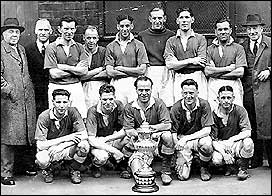
The club's first game was a 2-0 win away at Wigan Athletic on August 31, 1929, in which Reg Stockhill scored aged just 15 years and 281 days. He remains to this day the youngest player to have represented the side.
In 1932, City relocated from their original Fulfordgate ground to Bootham Crescent, their current home. The date of August 31 was also the date of City's first game there, a 2-2 draw with Stockport County.
Six years later the ground held its record attendance of over 28,000 when York played host to Huddersfield Town in an FA Cup Sixth Round tie. You can see how packed the ground was by the picture underneath, as the fans are spilling onto the pitch.
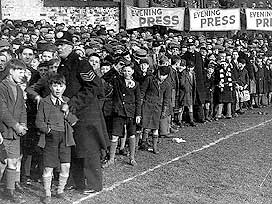
The side's cup run had evidently captured the imagination of the whole country, as is reflected by a cartoon from a national paper pictured below.

Soon after, World War Two began and the football club had to wait until 1947 until its next taste of action. However, the side's form was dropping and in 1950 they finished as the bottom side in the league. Thier fortunes picked up after the turn of the decade, though, and in 1955 a famous FA Cup run occurred.
Wins over three top-flight sides; Blackpool, Tottenham and Notts County earned City a semi-final clash with another big side - Newcastle United. The legendary Arthur Bottom was on target for the Minstermen but a 1-1 draw was the outcome in front of a full house at Hillsborough, and a replay at Sunderland was needed. Although City did not reach the final after the Magpies beat them 2-0, the cup run still goes down as one of the club's biggest achievements, and the players shown below are those who featured in it.

Three seasons later saw the North/South Division Three divide come to an end. The top 12 clubs from each section would form a new Division Three, with the bottom 12 creating Division Four. City were desperately unlucky to finish 13th on goal average, but the next season they made up for it by securing the club's first promotion in its history. However, the next season they slid straight back into Division Four, and it wasn't until 1964-65 that they were again promoted. Yet again City's Division Three experience lasted a single year, and in the troubling times that followed, City had to apply for re-election under three different managers. By 1970-71 the club seemed to have turned the corner, as Tom Johnston's side finished third to go up, and two years later finished third in Divison Three to take the side into Division Two for the first time ever. The basis of City's success was the solid central defensive partnership of Chris Topping and Barry Swallow, the latter of whom is pictured below.
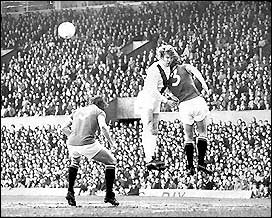
The Minstermen's success was short-lived, though, as Johnston was replaced as manager by Wilf McGuinness, and successive relegations saw City back at square one: in Division Four. Yet when Denis Smith took over the reigns in 1982, there was a buzz about the place again, and history was made in the 1983-84 season when York became the first club to secure 100 points in a single season, totalling 101 to win their first silverware - the Division Four title. Seen below are players celebrating the momentous points tally.
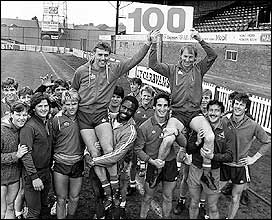
The following season was also a landmark campaign for YCFC, as they completed a giant-killing act in the Fourth Round of the FA Cup against Arsenal at Bootham Crescent. It was Keith Houchen who scored the winner from the penalty spot, and he would later go on to win the trophy with Coventry. An even more mouthwatering prospect came in the Fifth Round, with Liverpool, then at the peak of their greatness, travelled to Bootham Crescent. Another great display saw City grind out a 1-1 draw, but they finally succumbed at Anfield, with Liverpool running out 7-0 winners. But when Smith moved on and was replaced by Bobby Saxton, history repeated itself as City were again relegated to Division Four. John Bird took over from Saxton, but was equally unsuccessful so the job was handed to John Ward. It was Ward who moulded a side out of a combination of youth players, such as Dean Kiely and Jon McCarthy, and transfer coups, such as Paul Barnes. This side was chasing the newly-titled Division Three (after the introduction of the Premiership) title, but Ward left for Bristol Rovers with two months of the season left. Alan Little made the step up from assistant manager to full-time boss, and he guided City into fourth place - good enough for the club's first venture into the play-offs. Little's men overcame Bury in a close two-legged semi-final, and York were on their way to Wembley.

The final against Crewe Alexandra ended goalless after 90 minutes, but City's Gary Swann gave the Minstermen what seemed like the winning goal. However, defender Steve Tutill made a poor challenge and gave Crewe a penalty in the dying minutes. Crewe converted the spotkick, and the tie would be decided on a penalty competition. The score in this competition was level until Dean Kiely saved Gareth Whalley's penalty, leaving Wayne Hall, lovingly known as 'Ginner' by the City faithful, with the responsibility of sending City into Division Two. He obliged, and celebrations ensued both at Wembley and back in York. Pictured underneath are two of the heroes, Kiely and Hall, enjoying a well-earned victory.
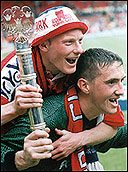
The success under Alan Little continued into next season, as the Minstermen made the Division Two playoffs, but this time could not progress past the semi-final stage. The following season the club attained a respectable position of 9th, and the next season; 1995/96, would be host to another of City's giant-killing feats. After being drawn away at Old Trafford in the Second Round (First Leg) of the League Cup, then known as the Coca-Cola Cup, chances looked slim. However, Little's men pulled off surely the shock of the season as two goals from hero Paul Barnes and one from defender Tony Barrass made the scoreline a shocking 3-0 to York. In the return leg at Bootham Crescent, played in front of a packed crowd, Alex Ferguson fielded a full-strength side including big names such as Eric Cantona, David Beckham, Ryan Giggs, Gary Neville, Paul Scholes and Peter Schmeichel. This time United outclassed City, and reduced the deficit back to 3-3, but Scott Jordan ensured City had the last laugh by sealing a famous 4-3 aggregate win. As you can see below, Ryan Giggs was no match for the might of the Minstermen.
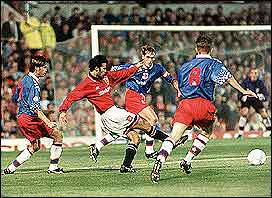
City did take an early lead in their Third Round tie at Loftus Road, but QPR eventually overcame the battlers 3-1. In the league, things were not so rosy, as Little could only steer his side to 20th position - one place above the drop zone. The next season formed almost an exact replica of the first - a giant-killing act against a Premiership side in the Coca-Cola Cup Second Round, this time at the expense of Everton as City drew 1-1 at Goodison Park then triumphed 3-2 in the return leg, another Third Round exit to a big side, on this occasion a 2-0 defeat at the hands of Leicester City, and another 20th finish, though this time the gap in points between City and the relegation zone was even less. The following season saw some improvement in league form - a respectable 16th finish, but no cup runs this time, and when halfway through the 1998/99 season the club were again struggling, Little was relieved of his duties by chairman Craig, and replaced by player-boss Neil Thompson. Yet the unthinkable happened when City were relegated with 50 points, despite having been outside the relegation places for all but the last few minutes of the season, and after the poor form continued into the millenium, Thompson was sacked and replaced by the more experienced Terry Dolan. In the few games of the 1999/2000 season he was in charge of the club for, Dolan steered the club to safety, but another season of disappointment followed the next year as the club finished 17th, though a small FA Cup run which saw the club travel to Leicester for the Third Round briefly re-ignited the fans' hopes, but the Foxes won 3-0. Another indifferent campaign followed, with another FA Cup run which was ended in the Fourth Round by Fulham, but again the final position improved to 14th. With a new chairman in place, the stage was set for a promotion push in the 2002/2003 season, and the club's early season form which saw them reach as high as 2nd in the league was encouraging. But the form gradually slipped away, and when the club entered administration in January a playoff spot looked an outside bet at best. However, the players and fans pulled together during the difficult times and for the first game in the reign of the Supporters' Trust, City beat Southend 2-0 and climbed to 3rd, a place good enough for automatic promotion, with 6 games left. A reversal of fortune, though, saw City fail to win any of those six, and indeed the club failed to score in a dismal last four games, and an improved but disappointing finish of 10th was the end result. Consequently, and for financial reasons, Dolan was sacked during the summer months to be replaced by captain Chris Brass in a player-manager role, and that is the current situation as it stands.
|





